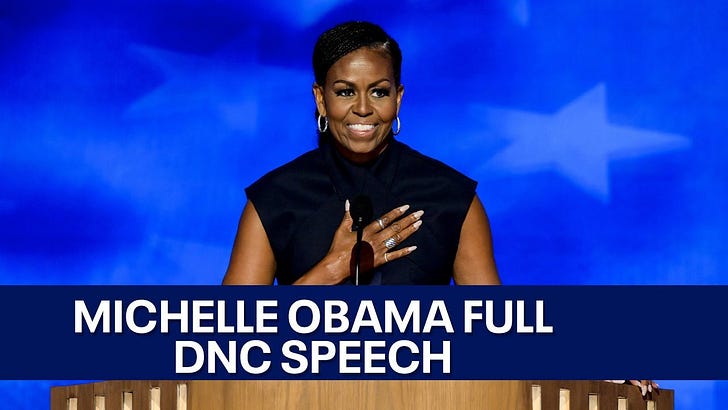This post goes out to both free and paid subscribers, but if you are not already a paid subscriber and value this effort and our growing community, please consider upgrading to a paid membership. Thanks in advance for your financial support of my work —it’s what allows me to keep researching and writing!
“[Vice President Kamala Harris] understands that most of us will never be afforded the grace of failing forward. We will never benefit from the affirmative action of generational wealth”.
You can listen to the former First Lady’s barn-burner of a DNC speech, above, but I’ll focus on one, profound sentence that hit me hard: Most of us “will never benefit from the affirmative action of generational wealth”. It apparently was a highlight for many other people, too, because there has been much written about it in the weeks following the convention. Here’s one particularly good analysis from the Washington Post: “With six words, Michelle Obama rewires America’s conversation on race.”, August 21, 2024.
My guess is that some writer or writers have made general comparisons between the concepts of affirmative action and generational wealth before, but probably not this directly—and it needs to be said, well, this directly.
In 1978, the United States Supreme Court approved the use of an applicant’s racial background as one of “many holistic factors in an admissions decision", but at the same time struck down racial quotas (See Regents of Univ. of California v. Bakke, 438 U.S. 265 (1978)). The Court affirmed this ruling numerous times over the decades, but struck it down 45 years later.
In 2023, with a 6—3 decision along ideological lines, the Court overturned nearly a half century of precedent (as it had done the previous year when it eliminated a woman’s Constitutional right to choose an abortion), and prohibited colleges and other learning institutions from considering race as a factor, aka., affirmative action, in the admissions process.
But what other factors can, and do, colleges legally consider as part their choices for student admission, especially at elite institutions? They use generational wealth. And generational wealth often correlates with legacy admissions. If a prospective student is fortunate enough to be born into a family that could not only afford to send their child or children to an elite college, but who also had attended that same elite college and/or was able to make donations to the institution’s endowment fund, that student literally got a boost in the admissions process, an extra check mark next to their name that will be considered when deciding whether that student gets the opportunity to enter its hallowed grounds…and a leg up in earning the money their parents did.
Additionally, these same students presumably receive the advantage of generational wealth passed onto them from their parents, often through more initially expensive and more tax protective vehicles to pass money to heirs, like various types of trusts, as one example.
Affirmative action was supposed to be a small boost for minorities, who explicitly had been denied equal opportunity of our laws for centuries, and who for the most part, did not have generational wealth to call on as a back-up. Affirmative action was supposed to offer a tiny correction for our country’s collective misdeeds. And now it is gone but legacy admissions remain.1 I quoted statistics from a New York Times article in my recent post discussing elite college admission practices:
“For applicants with the same SAT or ACT score, children from families in the top 1 percent were 34 percent more likely to be admitted than the average applicant, and those from the top 0.1 percent were more than twice as likely to get in.” The New York Times, July 24, 2023.
And a 2023 report demonstrates why these statistics are relevant right now— the report calls this phenomenon, “the amplification of privilege across generations.”
Leadership positions in the United States are held disproportionately by graduates of a small number of highly selective private colleges. Less than half of one percent of Americans attend Ivy-Plus colleges (the eight Ivy League colleges, Chicago, Duke, MIT, and Stanford). Yet these twelve colleges account for more than 10% of Fortune 500 CEOs, a quarter of U.S. Senators, half of all Rhodes scholars, and three-fourths of Supreme Court justices appointed in the last half-century (Figure 1).1 Ivy-Plus colleges also enroll a disproportionate share of students from high-income families: students from families in the top 1% of the income distribution are more than twice as likely to attend an Ivy-Plus college than students with comparable SAT or ACT scores from the middle class (Figure 2).
I’ve thought about generational wealth or the lack thereof, since at least 2012, when I read this article in The New York Times, written by Ron Lieber, the “Your Money” columnist for the Times. His analysis of what happens when you don’t have a personal safety net, let alone wealth passed on by a family member, helped me to better understand my poor financial situation at that time.
Lieber couched the issue in terms of a “living inheritance” — what parents who are willing and able while they are still alive, give their children in terms of monetary support to ease their transition through adulthood. He also discussed how difficult it can become without that support.
The less help you have as an adult starting out, the harder you have to work to make the next geographic, career and economic step up. If you lack that help, any and all mistakes (and there will be plenty) often have much bigger consequences. And the lack of any family help can have a compounding effect on the millions of people who have negative net worths well into adulthood thanks to their student loan debt.
What particularly resonated with me (probably because I did make a number of mistakes) is the idea that the mistakes that we will all inevitably make have “much bigger consequences” without access to even a small financial cushion. As Michelle Obama said, “…most of us will never be afforded the grace of failing forward”.
________________________________________________________________________
What do you think about these issues? Can generational wealth and legacy admissions to elite schools be correlated with affirmative action? If affirmative action criteria have been eliminated by law, should all colleges eliminate legacy admissions to help equal the playing field?
Any other thoughts? Feel free to leave them in the Comment Section below—thanks!
The preference for legacy applicants have been dropped by a few colleges, like Wesleyan University in Connecticut and M.I.T. and Amherst Colleges, in the wake of the U.S. Supreme Court decision last year striking down affirmative action criteria in college admissions.













Share this post